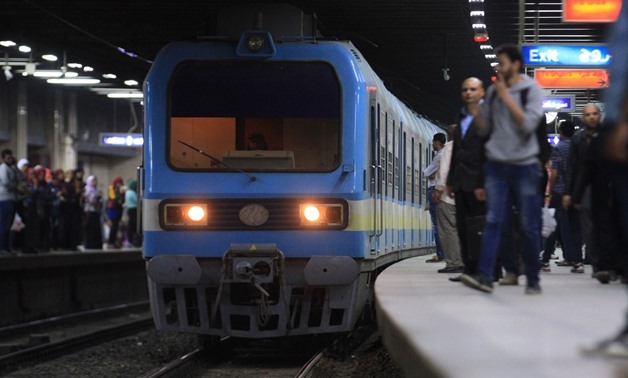
1st line of Cairo metro- Egypt Today/ Hussein Tallal
CAIRO – 23 May 2018: A number of ministers, led by Prime Minister Sherif Ismail, arrived on Wednesday at the construction site of the third phase of Line 3 of Cairo’s metro to launch the new giant drilling machine that will be used to dig the longest metro line in Egypt.
The event was attended by Minister of Transport Hisham Arafat, Minister of Electricity Mohamed Shaker, Minister of Local Development Abu Bakr el-Gindy, Cairo Governor Atef Abdel Hamid, and former ministers of transport Galal Saeed, Hany Dahy and Alaa Fahmy.
The third phase of the third metro line will connect the working-class districts of Attaba, Bulaq and Imbaba with Cairo University in Giza. The phase will also pass through well-off neighborhoods like Zamalek, Mohandiseen and Agouza. The construction on the 18-kilometer phase officially started in 2017; it includes 15 stops, including Zamalek.
In his speech, National Authority for Tunnels (NAT) Chairman Tareq Gamal el-Din said that the construction works of the third phase will conclude and be inaugurated within six years.
He added that 93 percent of the construction works of the fourth phase are completed, at a cost of LE 8.5 billion ($473 million).
The third line with its four phases would save nearly two million daily commutes above the ground, reducing Cairo’s traffic congestion, shortening the duration of commutes and saving LE 250 million in the cost of public transportation buses. The project would save up to LE 2.72 billion a year overall, according to NAT’s official website.
Fare rise dispute
Earlier this month, the government decided to increase the metro fare for the second time, triggering anger among citizens who are currently suffering from the dramatic surge in prices following the 2016 flotation of the Egyptian pound.
The new fare calculation is based on the length of each commute and the number of stations used, instead of having a fixed ticket price for an unlimited number of stations.
Commuters will be charged a base fare of LE 3 for the first nine stops, and an additional LE 2 (total LE 5) for seven more stations. The highest ticket price has been fixed at LE 7 if the commuter will use the metro for more than 16 stations.
The move was described by the government as “necessary” due to huge financial losses incurred by the sector, and in order to improve the service of the subway that works for 20 hours every day.
Following the decision, the metro sector announced expanding metro lines and purchasing new air-conditioned metro carriages. At least two lawsuits were filed against the increase, demanding the government backtrack its decision.
“The current trend taken by the government to increase ticket prices by a minimum of three pounds and a maximum of seven pounds is to charge the cost of investment on the price of the ticket, and not only the cost of operation and maintenance,” said a report issued by the Egyptian Initiative for Personal Rights (EIPR), criticizing the increase.
The report explained that companies normally record losses in their financial accounts due to spending large investments whose fruits are expected to be reaped in subsequent years.
Around 3.5 million Cairenes use the metro every day. Launched in 1987, the metro has since become the most important means of transportation, helping passengers to avoid getting stuck in Cairo traffic or having to negotiate fares with unmetered taxis.

Comments
Leave a Comment